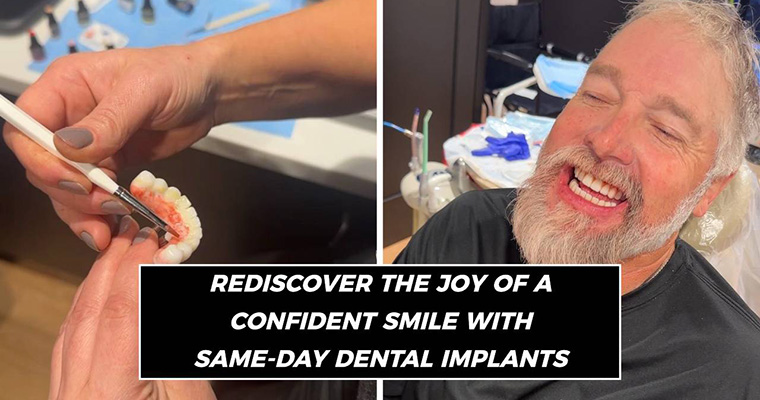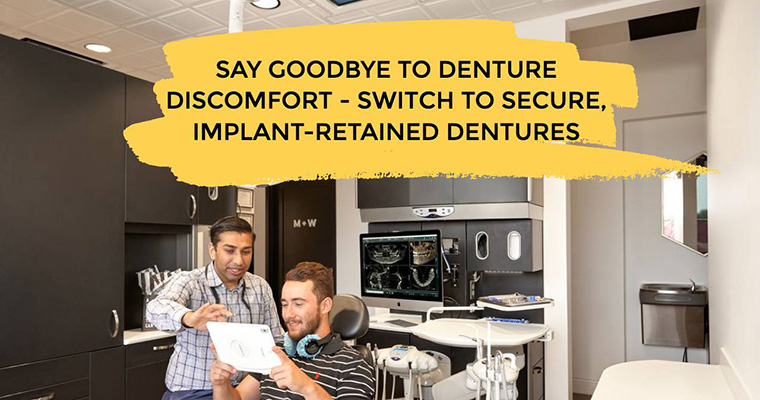Denture Solutions Near You
A comprehensive guide to understanding your Denture needs
Easy patient financing available.
Choosing the Right Denture Solution Can Be A Life-Changing Decision

Dentures are not merely a replacement for missing teeth; they restore confidence, functionality, and comfort. Knowing what suits your lifestyle and dental needs is paramount in selecting the perfect fit.
Types of Dentures Available
The Benefits of Wearing Dentures
Improved Oral Functionality
Dentures are designed to restore the functionality of natural teeth. They allow individuals to chew and speak properly, which can significantly improve quality of life.
Aesthetic Enhancement
Modern dentures are crafted to mimic the look of natural teeth closely, thereby enhancing the aesthetic appearance of one’s smile and providing a more youthful and confident appearance.
Customizable Fit
Dentures can be custom-made to fit the unique contours of an individual’s mouth, ensuring maximum comfort. They can be adjusted to accommodate changes in the mouth’s structure over time, maintaining an optimal fit.
Supports Facial Structure
By providing support for the facial muscles, dentures can prevent the facial sagging that often occurs with tooth loss, thus preserving the natural shape of the face.
Durability and Longevity
Dentures are made from advanced materials that are designed to be durable and long-lasting. With proper care and maintenance, they can serve the wearer for many years.
Promotes Digestive Health
By enabling proper chewing, dentures aid in the digestion process. Properly digested food is essential for good nutrition and overall health, making dentures an important factor in maintaining digestive wellness.
Your Smile Is in the Best Hands
Nashville Dentistry Co. is voted top dentist year after year.

What Is the Process for Getting Dentures?
Comprehensive Assessment
At your denture consultation, Dr. Patel will examine your gums and any remaining teeth to determine your candidacy for dentures. Even as an existing denture wearer, it’s important to note that the mouth and gums evolve over time, necessitating a reassessment. Should additional dental work be required prior to crafting your dentures, we will discuss this with you beforehand. Once you’re ready to proceed, we’ll take impressions of your mouth to construct the foundation of your new dentures.
Bite Orientation
During this visit, we’ll fit wax models in your mouth to determine the alignment of your bite and the precise positioning for the teeth on your new denture. Our team will guide you in choosing the right size, shape, and color of the teeth for a natural look. Secondary impressions may be taken with custom trays to ensure accuracy. These impressions and models are then sent to our lab, where a mock-up of your denture is created.
Try-In
You’ll have the chance to evaluate a wax mockup of your denture, which incorporates the teeth options you previously selected. Though not the final fit—as it’s still in wax—this trial version offers a clear preview of your denture’s appearance. This stage allows for any adjustments; teeth can be repositioned, raised, lowered, or even slightly twisted to more closely resemble your natural teeth. We suggest taking the trial denture home for a day to assess its look in your usual setting, with provided care instructions to handle it safely. Once you’re satisfied with the design, we will proceed to fabricate your final denture in our lab.
Final Fitting
Using the wax mockup as a blueprint, our lab will craft your new teeth. After fitting, it’s common to need some fine-tuning to ensure the denture settles in comfortably. As you adapt to your new dentures, it’s quite normal to require a few follow-up visits for minor adjustments, especially since the fit will differ from your old dentures. If you don’t perceive a need for further adjustments, we still schedule a review appointment six weeks after fitting to check on your bite and the overall adaptation to your new dentures.
Denture Related FAQs
Get the answers from the top dentist in Brentwood, TN.
-
What should I expect when getting used to new dentures?
Getting accustomed to new dentures may take some time. Initially, they may feel unfamiliar or bulky in your mouth, and it’s common to experience minor irritation or increased saliva flow. Your speech might be affected temporarily, but these issues typically resolve as you adjust to wearing your dentures daily.
-
How do I care for my dentures?
Dentures require daily cleaning with a soft-bristle brush and a non-abrasive denture cleaner. Avoid using regular toothpaste as it can scratch the surface. When not in use, keep your dentures moist by placing them in water or a denture-soaking solution to prevent warping. Always handle your dentures carefully to avoid dropping them.
-
Can I eat normally with dentures?
While dentures restore most of your chewing ability, it’s advisable to start with soft foods cut into small pieces. Chew slowly using both sides of your mouth to keep the dentures in place. As you get more comfortable, you can gradually return to your regular diet, though you should remain cautious with hard, sticky, or particularly chewy foods.
-
How often do dentures need to be replaced?
Dentures typically last between 5 to 7 years before they need to be replaced. However, regular check-ups are important as your mouth changes shape over time, which can affect the fit of the denture. An annual visit to your dental care provider can help ensure your dentures remain comfortable and functional.
-
Is it possible to repair broken dentures?
Yes, dentures can often be repaired if they crack or break. However, it’s crucial to see your dentist for professional repair rather than attempting to fix them yourself. Improper repairs can cause greater damage or affect the fit of the denture. In many cases, the repair can be done quickly, sometimes on the same day, depending on the extent of the damage.


